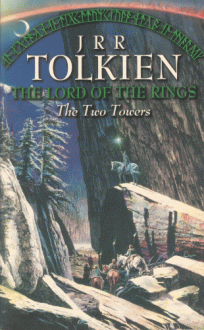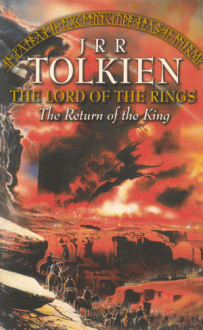"But," said Sam, and tears started in his eyes, "I thought you were going to enjoy the Shire, too, for years and years, after all you have done."
"So I thought too, once. But I have been too deeply hurt, Sam. I tried to save the Shire, and it has been saved, but not for me. It must often be so, Sam, when things are in danger: someone has to give them up, lose them, so that others may keep them."
- Frodo and Sam
Book Six, Chapter IX: Grey Havens
pp. 1346-7
Warning: This review will be of the entire novel (meaning volumes I-III, or The Fellowship of the Ring, The Two Towers and The Return of the King), so there will be a large quantity of spoilers. If you have not read the books but have seen the films, I think you'll be okay. If you haven't done either, you've been warned so proceed at your own risk -- though these books have been out since the mid-1950s, so you've had plenty of time to be acquainted with their content.
The Lord of the Rings follows the story of a little hobbit named Frodo Baggins, who is entrusted with the care of the One Ring -- a ring that will let the enemy rise again with full strength and power. Frodo must go on a quest to Mordor and destroy the Ring by casting it into the cracks of Mount Doom from which it was forged in order to fully get rid of the evil of Sauron.
Tolkien's novel is one of my favourites of all time. There's something so beautiful about friendships and loyalty grown through adversity and hardships that makes me all teary when I even think about it. The novel really makes you feel the care the fellowship have for each other as comrades and as friends. Yeah, maybe it's a little homoerotic in that eight dudes on a long trek east will have a tenderness that modern bros will think is a bit too feminine for their liking, but whatever friendships are amazing things and those bros are just too insecure in their masculinity. These people become the best of friends in their quest, basically brothers, so don't be asking when are Frodo and Sam going to kiss 'cause that's not cool. (Of course, it would've been cool to have either a woman or one of them gay for diversity reasons, but y'know the '50s and all.)
The novel is separated into six books (with two packaged into each volume), with appendices and an index at the end. Book One follows from Bilbo's 111th birthday/Frodo's 33rd birthday to when the four hobbits and Strider make it to Rivendell. Book Two begins with the Council of Elrond to discuss what is to be done with the Ring and ends with Frodo and Sam leaving the fellowship. Book Three starts with Boromir's death and the capture of Pippin and Merry, and then ends with the Ents taking down Isengard and Pippin being whisked away to Minas Tirith by Gandalf. Book Four follows only Frodo and Sam as they meet up with Gollum and make their way to Mordor, running into Faramir and ending with Frodo being taken by Orcs after being poisoned by Shelob (the giant spider). Book Five refocuses on everyone else and covers the Battle of the Pelennor Fields, including bringing Faramir, Éowyn and Merry to the Houses of Healing, and then everyone setting off for the Black Gates. Book Six covers Frodo and Sam's journey to Mount Doom and the completion of their quest, then their journey back home. Why, yes, a lot of stuff does happen.
While Frodo and Sam's journey is very important in actually ending Sauron, I find the books that focus on Aragorn, Legolas, Gimli, Pippin and Merry to be an infinite amount more interesting. I think it's because they encounter more trouble and get to fight battles. It's not until Frodo and Sam make it into Mordor that their journey starts to pick up. Most of the time, the pair of them are just walking past rivers, over hills, hiding under rocks, etc. Tolkien's prose is beautiful, but my god it's hard to make that fun. Before they split from the rest of the Company, Book One is a bit of a drag, but only because I think three chapters involving Tom Bombadil is at least two chapters too many. I mean, nothing even goes on when they're there! It sets up Tom Bombadil as a mysterious character, but it's ultimately pointless.
A lot of people when they read the novel now think that Tolkien is a very passive writer and that he was a poor writer despite how great his imagination and world-building was. I think that's an opinion that doesn't reflect what I've read of Tolkien's work. It's true that Tolkien wrote a lot of description about the landscapes and the buildings, but that's kind of what world-building is all about; that doesn't make him a poor writer. Not only that, but each chapter in The Lord of the Rings has a clear event that occurs so it's not like there are any chapters where something big or important doesn't happen. Tolkien's prose is also very prosodic, which is of course more pronounced when you read it aloud. I personally think the main reason people find Tolkien boring now is because of the way he structures his sentences: nobody really writes the way he does anymore. Tolkien was all about moving phrases or words to the front of the sentence for stress or to draw attention to it, something that Latin was really fond of. Really, I think it's unjust to judge Tolkien's prose as bad when he was doing something with it that we're no longer used to. This is all a matter of taste, of course.
Besides the story itself, a large reason I love this novel is because of the linguistic thought Tolkien put into it. He made up languages, but not just that: he made up language families. As someone studying linguistics, I cannot tell you how inspiring and amazing that is. That's like making up a branch of Indo-European languages, which means it's like making up all the Germanic languages or the Italic languages. The most I could say is that there is only one man-made language that has truly caught on enough that there have become native speakers of it, and that's Esperanto. And now people actually learn to speak and write the languages in Tolkien's world, and not only that but it's a fully-formed language. As a linguistics nerd, I'm dying over here!
Yes, there are issues with Tolkien's novel, like the lack of female characters, the pacing can be slow, the overarching theme of racism since each and every Orc ever has always been a creature worth exterminating, but these faults aren't enough for the novel to be dismissed. It has its issues like every other novel, and coming from the 1950s it's not actually that bad. The Lord of the Rings really isn't for everyone, but I think everyone should at least give it a try. After all, Tolkien has contributed so much to Western culture that it would be rude not to take a little peek.

 Log in with Facebook
Log in with Facebook 












